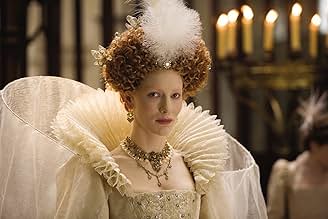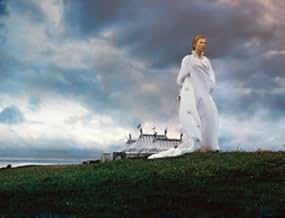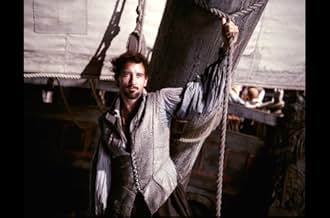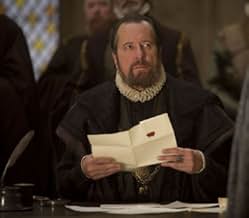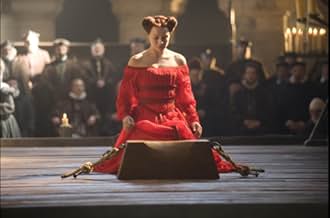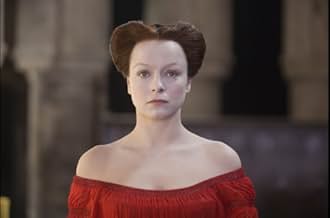La reina Elizabeth sufre múltiples crisis al final de su reinado, incluyendo intrigas de la corte, un complot de asesinato, la armada española y decepciones románticas.La reina Elizabeth sufre múltiples crisis al final de su reinado, incluyendo intrigas de la corte, un complot de asesinato, la armada española y decepciones románticas.La reina Elizabeth sufre múltiples crisis al final de su reinado, incluyendo intrigas de la corte, un complot de asesinato, la armada española y decepciones románticas.
- Dirección
- Guionistas
- Elenco
- Ganó 1 premio Óscar
- 8 premios ganados y 33 nominaciones en total
- King Philip ll of Spain
- (as Jordi Molla)
- Dirección
- Guionistas
- Todo el elenco y el equipo
- Producción, taquilla y más en IMDbPro
Opiniones destacadas
In addition to Blanchett, the supporting cast all turn in superior work. The sets, costuming, and period speech are all mastered well, creating a true feel for the era being depicted. Although many of the people and events are real, a few liberties have been taken apparently to spice up the drama. Such fictionalizing probably wasn't necessary; enough happened during this queen's rule to make the story interesting without it. One example: the flashy Sir Walter Raleigh was indeed a favorite of the queen, but this movie puts them in a romantic triangle that just gets in the way of other things going on. Also, Raleigh, better known as an explorer, was not the hero in the battle with the Spanish Armada.
Blanchett shines when she delivers the famous speech to the troops on the eve of the Spanish invasion. But even she is burdened by the director's preoccupation with Elizabeth as a suffering angst-filled woman facing middle-age with less bravery than facing the world's most powerful fleet at that time. We get endless views of her taking her wig off in secret, and staring at a mirror. The first time this device is used is fine to get the point across of her hopeless situation of never taking a husband (and the slow advance of time having its way), but we see her looking like a shriveled ghost in too many such scenes, and it's way overdone in this context. Her "real" hair sans the wig looks like an inebriated Edward Scissorhands was her hairdresser, and her pale complexion looks like somebody pasted white-out all over her face.
Those few mistakes notwithstanding, this is a fine biopic with superior acting by Blanchett, and is recommended.
They could have made this a spectacular movie, nice story, great costumes. But after the first 45 minutes it get boring and you ask yourself why. Then towards the end i hoped to see a great battle at sea, but it didn't happen.
The movie is watchable but don't expect too much.
It might be wiser to rent this one on DVD instead of going to the movies.
The set-up is rich with possibilities only partially realized on screen. Protestant England is on its knees, as Roman Catholic Spain has become Europe's most powerful country. Now in her early fifties, Elizabeth is vulnerable since Phillip II of Spain is intent on conquering England and especially because she has not married and produced an heir. Next in line is her cousin, Mary, Queen of Scots, a devout Roman Catholic imprisoned in a castle in Northamptonshire. Elizabeth has proved to be a tolerant ruler as she allows her country's Roman Catholics to maintain their religious beliefs, even though they see Mary as the only rightful Queen. In the meantime, Sir Walter Raleigh has just returned from the New World and stimulated Elizabeth's passion for adventure and her long-dormant desire for romance. Complicating matters is Elizabeth's devoted lady-in-waiting, Bess, a comely beauty who attracts Raleigh's attention. Just as this standard triangle is established, there is a threat on Elizabeth's life known historically as the Babington Plot. Mary is beheaded for her connection to the plot, which gives Philip free rein to gain the Pope's approval to attack England. Elizabeth inspires her troops to face off with the much larger Spanish Armada, and the rest, as they say, is history.
It's no surprise that Cate Blanchett commands the screen in the title role and does her best to fill in the blanks left by the routine script. She manages to imbue the Queen with a hidden vulnerability at which comparatively imperious predecessors like Bette Davis and Glenda Jackson merely hint. The one drawback is that she is too young for the role, a point emphasized by the periodic and somewhat conceited use of flashbacks from the previous film in which her appearance has not changed significantly despite the make-up. Geoffrey Rush returns from the first film as Elizabeth's adviser, Sir Francis Walsingham, but he has less to do this time. As Raleigh, Clive Owen has no problem playing a dashing figure, but he seems more like a romantic's fabrication of what a bodice-ripping swashbuckler should be. Speaking with a strange burr, Samantha Morton has precious few scenes as the fanatical but forgiving Mary, and her pouty face and petulant manner seem at odds with previous characterizations. As Philip, Jordi Mollà is forced to play the king as a religious zealot, while Abbie Cornish's Bess strikes me as far too contemporary in manner to be credible as a lady-in-waiting, especially with the ongoing hints of lesbianism and a soft porn-like lovemaking scene with Raleigh.
Guy Dyas' production design, Alexandra Byrne's costumes and Remi Adefarasin's cinematography are all impressive in their splendor and meticulous detail, though I found the music by Craig Armstrong and A.R. Rahman far too intrusive. There are several extras with the 2008 DVD release starting with Kapur's commentary track, often insightful but excessively verbose. An eleven-minute making-of featurette is included, of course, but it is pretty standard with plenty of now-and-then comparisons with the 1998 film. Three other shorts are included one on Dyas' intensive work on the production design, one on the recreation of the climactic battle with a mix of ship replicas and CGI, and one on the actual locations used for the filming. There are nine minutes of deleted and extended scenes including one that too-realistically shows Mary's decapitated head. None of these extras helps make the experience of watching this film any more involving.
(Pros:) The cast is definitely the film's biggest asset. Cate Blanchett is incredibly brilliant even at times that the script fails to provide her with a worthy line. Her powerful performance is utterly captivating. Clive Owen's Walter Raleigh is as dashing as a man can be. As the man who charmed the Queen out of her heart and wits and dared to tell her not to act like a fool, Owen's Raleigh is daring at times, vulnerable at others, but always compelling and spectacular. Geoffrey Rush makes the best out of the very little that he's given to work with and Abbie Cornish and Samantha Morton are each great in their parts.
It's also worth a mention that the costumes and the locations are spectacular, paired with a few moments of good story-telling (only if those moments would last all through the film) they make a few absolutely extraordinary scenes. Another great characteristic of this film is it's subtlety, the emotions that are there yet not talked about, the wishes, feelings, disappointments, desires, and fears that are only hinted are the best parts of an otherwise disappointing story-telling.
(Cons:) Sloppy editing, campy scenes, and poor writing are what mostly hurts the film. Unfortunately the film's precious time is spent on side-stories that could have easily been discarded, and consequentially, not enough time is spent on the development of the main story. Everything that happens after Sir Walter meets Elizabeth seems forced. Vague at times, the film seems to be in rush to hit certain notes at certain times. Elizabeth meets Walter and a few lines later she's mad about him, so is Bess and so on. The audience is not given the chance to feel or take in what's really happening, not even enough time to get to know the characters let alone feel what they are going through. At times, it seemed as though many of the scenes were cut short in the editing room and had lost their essence in the process. (If that's the case, lets hope the DVD includes the director's cut.)
The film could have benefited from more climax and action (the battle is barely touched), (other than a few great scenes) most of the story is told through conversations in closed areas. More than anything, the writers leaned on poetic lines to deliver their story. Also, for all it's subtlety, the film takes sides so obviously that it hurts any chances it had at reaching some level of realism or fairness. For instance, not only Phillip of Spain is utterly evil, he's one ridiculous, petty, dim character.
Overall, the cast certainly makes the experience worthwhile, and as long as one does not expect absolute greatness or historical accuracy, this film can be great entertainment for most.
The focus is narrower in time, beginning in 1585 and climaxing with the defeat of the Spanish Armada three years later in action scenes absent from the first film. The main problem is the script from Michael Hirst & William Nicholson. The narrative is too slow and too confused and some of the lines are somewhat banal, while the attempt to create a romantic storyline between the 'virgin' queen and the adventurer Walter Raleigh (an able Clive Owen) is too contrived and unlikely.
¿Sabías que…?
- TriviaWhen Elizabeth arrives at St. Paul's Cathedral, construction is going on. In real life, St. Paul's actually needed repair work. Director Shekhar Kapur decided to improvise and gave the workers costumes and period tools to cut real stone that was being installed in the cathedral. The workers in the scene are real-life stonemasons and construction workers.
- ErroresThe real Babington Plot to assassinate Queen Elizabeth at the altar was thwarted in the planning stages.
- Citas
Queen Elizabeth I: Go back to your rathole! Tell Philip I fear neither him, nor his priests, nor his armies. Tell him if he wants to shake his little fist at us, we're ready to give him such a bite he'll wish he'd kept his hands in his pockets!
Don Guerau De Spes: You see a leaf fall, and you think you know which way the wind blows. Well, there is a wind coming, Madame, that will sweep away your pride.
[turns to leave with his ministers]
Queen Elizabeth I: I, too, can command the wind, sir! I have a hurricane in me that will strip Spain bare if you dare to try me!
- ConexionesEdited from La hija de Ryan (1970)
- Bandas sonorasVolta a 4
Written by John Dowland
Performed by The Consort of Musicke
Conducted by Anthony Rooley
Courtesy of The Decca Record Company Ltd
Under licence from Universal Music Operations Ltd
Selecciones populares
Detalles
- Fecha de lanzamiento
- Países de origen
- Idiomas
- También se conoce como
- Elizabeth: The Golden Age
- Locaciones de filmación
- Productoras
- Ver más créditos de la compañía en IMDbPro
Taquilla
- Presupuesto
- USD 55,000,000 (estimado)
- Total en EE. UU. y Canadá
- USD 16,383,509
- Fin de semana de estreno en EE. UU. y Canadá
- USD 6,153,075
- 14 oct 2007
- Total a nivel mundial
- USD 75,782,758
- Tiempo de ejecución1 hora 54 minutos
- Color
- Mezcla de sonido
- Relación de aspecto
- 1.85 : 1
Contribuir a esta página








